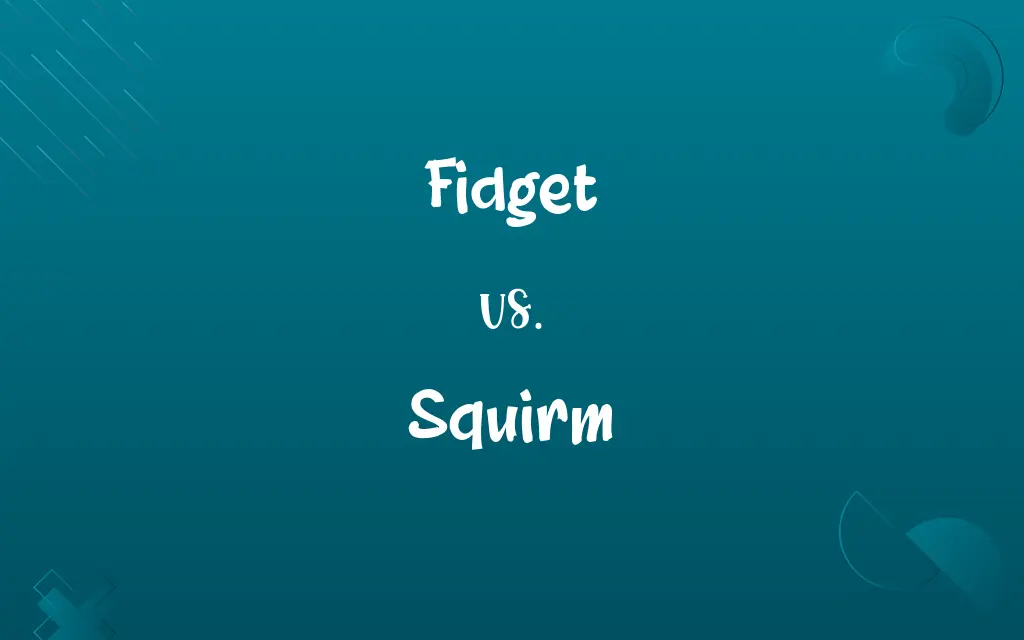Fidget vs. Squirm: Know the Difference

By Shumaila Saeed || Updated on December 25, 2023
Fidgeting involves small, often nervous movements or adjustments, while squirming is wriggling or twisting the body, usually due to discomfort or embarrassment.

Key Differences
Fidgeting is characterized by small, restless movements like tapping a foot, often due to nervousness or impatience, whereas squirming implies larger, more uncomfortable movements, often as a reaction to physical or emotional discomfort.
Shumaila Saeed
Nov 29, 2023
In social situations, someone might fidget with their hands or objects to relieve mild anxiety, while squirming usually indicates a stronger sense of unease or embarrassment, like shifting in a seat during an awkward conversation.
Shumaila Saeed
Nov 29, 2023
Fidgeting can be habitual or subconscious, such as playing with hair or a pen, and is not necessarily linked to discomfort, while squirming is generally a more conscious response to an immediate situation, like discomfort in tight clothing.
Shumaila Saeed
Nov 29, 2023
Children are often seen fidgeting when bored or restless, like tapping their feet, while squirming can be observed when they are in trouble or feel guilty, like wriggling in their chair when being scolded.
Shumaila Saeed
Nov 29, 2023
Fidgeting can sometimes be beneficial, helping to increase alertness or concentration, whereas squirming typically signifies a desire to escape or relieve an uncomfortable situation.
Shumaila Saeed
Nov 29, 2023
ADVERTISEMENT
Comparison Chart
Movement Type
Small, restless movements.
Larger, twisting or wriggling movements.
Shumaila Saeed
Nov 29, 2023
Common Causes
Nervousness, boredom, habit.
Discomfort, embarrassment, distress.
Shumaila Saeed
Nov 29, 2023
Purpose
To relieve nervous energy, increase focus.
To escape or respond to discomfort.
Shumaila Saeed
Nov 29, 2023
ADVERTISEMENT
Fidget and Squirm Definitions
Fidget
Fidgeting often occurs subconsciously.
He didn't realize he was fidgeting with his pen.
Shumaila Saeed
Nov 29, 2023
Squirm
Squirm can suggest embarrassment or awkwardness.
She squirmed when asked about her mistake.
Shumaila Saeed
Nov 29, 2023
Fidget
Fidget can imply impatience or boredom.
The students began to fidget during the long lecture.
Shumaila Saeed
Nov 29, 2023
Squirm
Squirm means to wriggle or twist the body.
The child squirmed in his mother's lap.
Shumaila Saeed
Nov 29, 2023
Fidget
Fidgeting can be a habitual action.
She tends to fidget with her hair when deep in thought.
Shumaila Saeed
Nov 29, 2023
ADVERTISEMENT
Squirm
Squirming often indicates discomfort.
He squirmed under the tight bandage.
Shumaila Saeed
Nov 29, 2023
Fidget
Fidget means to make small, nervous movements.
He began to fidget with his tie during the interview.
Shumaila Saeed
Nov 29, 2023
Squirm
Squirm implies a desire to escape an unpleasant situation.
The suspect squirmed under the intense questioning.
Shumaila Saeed
Nov 29, 2023
Squirm
Squirming can be a response to physical unease.
The audience squirmed in the hot, cramped room.
Shumaila Saeed
Nov 29, 2023
Fidget
Fidgets A condition of restlessness as manifested by nervous movements. Often used with the
A bored child who had the fidgets.
Shumaila Saeed
Oct 19, 2023
Fidget
(intransitive) To wiggle or twitch; to move the body, especially the fingers, around nervously or idly.
Shumaila Saeed
Oct 19, 2023
Squirm
To twist one's body with snakelike motions.
The prisoner managed to squirm out of the straitjacket.
Shumaila Saeed
Oct 19, 2023
Squirm
To twist in discomfort, especially from shame or embarrassment.
I recounted the embarrassing story in detail just to watch him squirm.
Shumaila Saeed
Oct 19, 2023
Squirm
To twist about briskly with contortions like an eel or a worm; to wriggle; to writhe.
Shumaila Saeed
Oct 19, 2023
Fidget
To move uneasily one way and the other; to move irregularly, or by fits and starts.
Shumaila Saeed
Oct 19, 2023
Squirm
To move in a twisting or contorted motion, (especially when struggling);
The prisoner writhed in discomfort
The child tried to wriggle free from his aunt's embrace
Shumaila Saeed
Oct 19, 2023
Fidget
A general nervous restlessness, manifested by incessant changes of position; dysphoria.
Shumaila Saeed
Oct 19, 2023
Fidget
A feeling of agitation expressed in continual motion;
He's got the fidgets
Waiting gave him a feeling of restlessness
Shumaila Saeed
Oct 19, 2023
Fidget
Fidget describes restlessness through minor movements.
Unable to sit still, he started to fidget in his chair.
Shumaila Saeed
Nov 29, 2023
Repeatedly Asked Queries
What causes someone to fidget?
Nervousness, impatience, or habit can lead to fidgeting.
Shumaila Saeed
Nov 29, 2023
Is fidgeting always a sign of anxiety?
Not always, it can also be a habitual or unconscious action.
Shumaila Saeed
Nov 29, 2023
Do fidget toys help with fidgeting?
Yes, they can provide an outlet for nervous energy.
Shumaila Saeed
Nov 29, 2023
Can adults squirm as well as children?
Yes, adults can squirm, often in response to discomfort or awkward situations.
Shumaila Saeed
Nov 29, 2023
What does it mean to squirm?
To move restlessly, often due to discomfort or embarrassment.
Shumaila Saeed
Nov 29, 2023
How can one reduce fidgeting habits?
Practicing relaxation techniques and mindfulness can help reduce fidgeting.
Shumaila Saeed
Nov 29, 2023
Can squirming be voluntary?
Usually, it's a reactive, involuntary response to discomfort.
Shumaila Saeed
Nov 29, 2023
Is there a medical condition related to excessive fidgeting?
Attention-deficit/hyperactivity disorder (ADHD) can involve hyperactive fidgeting behaviors.
Shumaila Saeed
Nov 29, 2023
Are there fidget toys designed to help with focus?
Yes, there are various fidget toys like stress balls or spinners that can help individuals manage their fidgeting.
Shumaila Saeed
Nov 29, 2023
Can fidgeting be a coping mechanism?
Yes, some people use fidgeting as a coping mechanism for stress or anxiety.
Shumaila Saeed
Nov 29, 2023
Is there a connection between "squirm" and feeling embarrassed?
Yes, people may squirm when they feel embarrassed or self-conscious, especially in front of others.
Shumaila Saeed
Nov 29, 2023
Is fidgeting considered impolite in social settings?
Excessive fidgeting can be distracting, so it's best to minimize it in formal or quiet settings.
Shumaila Saeed
Nov 29, 2023
Is "squirm" a transitive or intransitive verb?
"Squirm" can be both transitive (e.g., "He made her squirm") and intransitive (e.g., "She squirmed in her seat").
Shumaila Saeed
Nov 29, 2023
What are common examples of fidgeting behavior?
Examples include tapping one's fingers, bouncing one's leg, or twirling a pen.
Shumaila Saeed
Nov 29, 2023
Is "squirm" commonly used in formal writing?
It's more commonly used in informal or creative writing to convey a vivid image.
Shumaila Saeed
Nov 29, 2023
Can "squirm" be used positively?
In most cases, "squirm" is associated with discomfort, but it could be used humorously or playfully in some contexts.
Shumaila Saeed
Nov 29, 2023
What is the difference between "fidget" and "squirm"?
"Fidget" generally involves small, restless movements, while "squirm" implies larger, more noticeable twisting or wriggling motions.
Shumaila Saeed
Nov 29, 2023
Do children often squirm in their seats?
Yes, children often squirm when they're restless or impatient, especially in school.
Shumaila Saeed
Nov 29, 2023
Share this page
Link for your blog / website
HTML
Link to share via messenger
About Author
Written by
Shumaila SaeedShumaila Saeed, an expert content creator with 6 years of experience, specializes in distilling complex topics into easily digestible comparisons, shining a light on the nuances that both inform and educate readers with clarity and accuracy.









































































